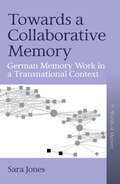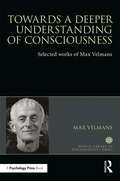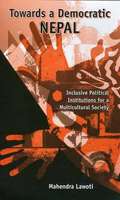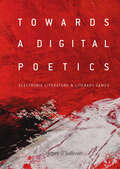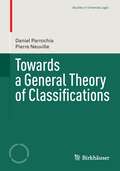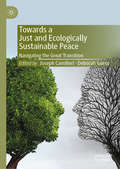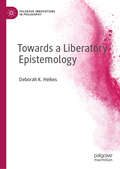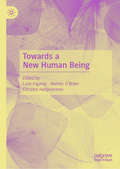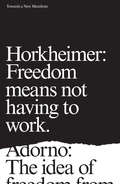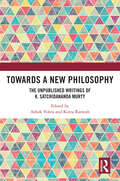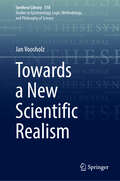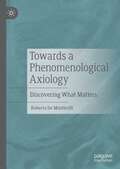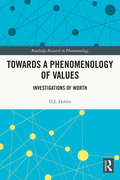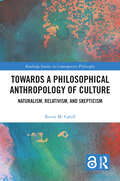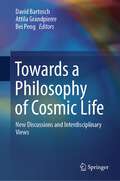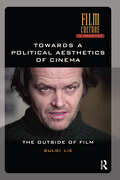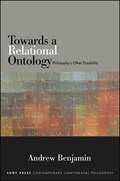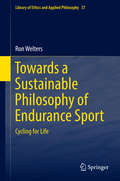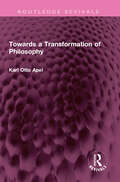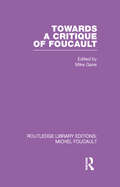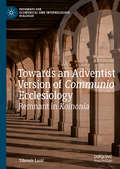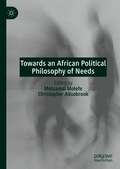- Table View
- List View
Towards a Collaborative Memory: German Memory Work in a Transnational Context (Worlds of Memory #9)
by Sara JonesFocusing on the memory of the German Democratic Republic, Towards a Collaborative Memory explores the cross-border collaborations of three German institutions. Using an innovative theoretical and methodological framework, drawing on relational sociology, network analysis and narrative, the study highlights the epistemic coloniality that has underpinned global partnerships across European actors and institutions. Sara Jones reconceptualizes transnational memory towards an approach that is collaborative not only in its practices, but also in its ethics, and shows how these institutions position themselves within dominant relationship cultures reflected between East and West, and North and South.
Towards a Critical Theory of Society: Collected Papers of Herbert Marcuse, Volume 2 (Herbert Marcuse: Collected Papers #2)
by Herbert MarcuseThis second volume of Marcuse's collected papers includes unpublished manuscripts from the late 1960s and early 1970s, such as Beyond One-Dimensional Man, Cultural Revolution and The Historical Fate of Bourgeois Democracy, as well as a rich collection of letters. It shows Marcuse at his most radical, focusing on his critical theory of contemporary society, his analyses of technology, capitalism, the fate of the individual, and prospects for social change in contemporary society.
Towards a Deeper Understanding of Consciousness: Selected works of Max Velmans (World Library of Psychologists)
by Max VelmansIn the World Library of Psychologists series, international experts themselves present career-long collections of what they judge to be their finest pieces - extracts from books, key articles, salient research findings, and their major practical theoretical contributions. In this volume Max Velmans reflects on his long-spanning and varied career, considers the highs and lows in a brand new introduction and offers reactions to those who have responded to his published work over the years. This book offers a unique and compelling collection of the best publications in consciousness studies from one of the few psychologists to treat the topic systematically and seriously. Velmans’ approach is multi-faceted and represents a convergence of numerous fields of study – culminating in fascinating insights that are of interest to philosopher, psychologist and neuroscientist alike. With continuing contemporary relevance, and significant historical impact, this collection of works is an essential resource for all those engaged or interested in the field of consciousness studies and the philosophy of the mind.
Towards a Democratic Nepal
by Mahendra LawotiThis book analyses the problem of the increasing political exclusion of ethnic, caste and gender groups in democratic Nepal and discusses its consequences for democracy and the stability of the country. While outlining alternative democratic institutions and proposing specific institutions that can include the diverse socio-cultural groups in Nepal, this book: - analyses the Maoist insurgency, arguing that political exclusion was a major cause for its genesis and growth; - examines the causes for the lack of democratic consolidation in Nepal; - provides the first comprehensive critique of the 1990 Constitution, identifying it as an important factor leading to the political exclusion of ethnic groups; - suggests the setting up of a new Constituent Assembly to address the social and political crisis in Nepal; - makes important recommendations to shape an inclusive and democratic Nepal which include federalism; a powerful House of Nationalities; a proportional electoral system; affirmative action policies and reservations; declaration of a secular state; a centralized judicial review; and the protection of minority rights in the Constitution. Overall, the author argues that unless Nepal's ruling elite becoms senstive to the needs of marginalized and excluded groups, the country could witness an escalation in violence. Highlighting a wide range of issues crucial to strengthening democracy in Nepal, this book is of interest ot students and academics studing Nepal and South Asia.
Towards a Digital Poetics: Electronic Literature & Literary Games
by James O'SullivanWe live in an age where language and screens continue to collide for creative purposes, giving rise to new forms of digital literatures and literary video games. Towards a Digital Poetics explores this relationship between word and computer, querying what it is that makes contemporary fictions like Dear Esther and All the Delicate Duplicates—both ludic and literary—different from their print-based predecessors.
Towards a General Theory of Classifications
by Daniel Parrochia Pierre NeuvilleThis book is an essay on the epistemology of classifications. Its main purpose is not to provide an exposition of an actual mathematical theory of classifications, that is, a general theory which would be available to any kind of them: hierarchical or non-hierarchical, ordinary or fuzzy, overlapping or non-overlapping, finite or infinite, and so on, establishing a basis for all possible divisions of the real world. For the moment, such a theory remains nothing but a dream. Instead, the authors essentially put forward a number of key questions. Their aim is rather to reveal the "state of art" of this dynamic field and the philosophy one may eventually adopt to go further. To this end they present some advances made in the course of the last century, discuss a few tricky problems that remain to be solved, and show the avenues open to those who no longer wish to stay on the wrong track. Researchers and professionals interested in the epistemology and philosophy of science, library science, logic and set theory, order theory or cluster analysis will find this book a comprehensive, original and progressive introduction to the main questions in this field.
Towards a Just and Ecologically Sustainable Peace: Navigating the Great Transition
by Deborah Guess Joseph CamilleriThis book addresses the need to develop a holistic approach to countering violence that integrates notions of peace, justice and care of the Earth. It is unique in that it does not stop with the move toward articulating ‘Just Peace’ as a human concern but probes the mindset needed for the shift to a ‘Just and Ecologically Sustainable Peace’. It explores the values and principles that can guide this shift, theoretically and in practice. International in scope and grounded in the reality of Indigenous and non-Indigenous Australia and the wider Asia-Pacific context, the book brings together important insights drawn from the Indigenous relationship to land, ecological feminism, ecological philosophy, the social sciences more generally, and a range of religious and non-religious cosmologies. Drawn from diverse disciplinary backgrounds, the contributors in this book apply their combined professional expertise and active engagement to illuminate the difficult choices that lie ahead.
Towards a Liberatory Epistemology (Palgrave Innovations in Philosophy)
by Deborah K. HeikesThis book offers a compelling examination of our moral and epistemic obligations to be reasonable people who seek to understand the social reality of those who are different from us. Considering the oppressive aspects of socially constructed ignorance, Heikes argues that ignorance produces both injustice and epistemic repression, before going on to explore how our moral and epistemic obligations to be understanding and reasonable can overcome the negative effects of ignorance. Through the combination of three separate areas of philosophical interest- ignorance, understanding, and reasonableness- Heikes seeks to find a way to correct for epistemological and moral injustices, satisfying needs in feminist theory and critical race theory for an epistemology that offers hope of overcoming the ethical problem of oppression.
Towards a New Human Being
by Luce Irigaray Mahon O'Brien Christos HadjioannouWith my own introduction and epilogue, Towards a New Human Being gathers original essays by early career researchers and established academic figures in response to To Be Born, my most recent book. The contributors approach key issues of this book from their own scientific fields and perspectives – through calls for a different way of bringing up and educating children, the constitution of a new environmental and sociocultural milieu or the criticism of past metaphysics and the introduction of new themes into the philosophical horizon. However, all the essays which compose the volume correspond to proposals for the advent of a new human being – so answering the subtitle of To Be Born: Genesis of a New Human Being. To Be Born thus acts as a background from which each author had the opportunity to develop and think in their own way. As such Towards a New Human Being is part of a longer-term undertaking in which I engaged together and in dialogue with more or less confirmed thinkers with a view to giving birth to a new human being and building a new world.–Luce Irigaray
Towards a New Human Being
by Luce Irigaray Mahon O'Brien Christos HadjioannouWith my own introduction and epilogue, Towards a New Human Being gathers original essays by early career researchers and established academic figures in response to To Be Born, my most recent book. The contributors approach key issues of this book from their own scientific fields and perspectives – through calls for a different way of bringing up and educating children, the constitution of a new environmental and sociocultural milieu or the criticism of past metaphysics and the introduction of new themes into the philosophical horizon. However, all the essays which compose the volume correspond to proposals for the advent of a new human being – so answering the subtitle of To Be Born: Genesis of a New Human Being. To Be Born thus acts as a background from which each author had the opportunity to develop and think in their own way. As such Towards a New Human Being is part of a longer-term undertaking in which I engaged together and in dialogue with more or less confirmed thinkers with a view to giving birth to a new human being and building a new world.–Luce Irigaray
Towards a New Manifesto
by Max Horkheimer Theodor AdornoA thrilling example of philosophy in action, Towards a New Manifesto reveals the fathers of critical theory, Adorno and Horkheimer, in a uniquely spirited and free-flowing exchange of ideas.A record of their discussions over three weeks in the spring of 1956, recorded with a view to writing a contemporary version of The Communist Manifesto, this conversation ranges across its central themes--theory and practice, labor and leisure, domination and freedom--in a register found nowhere else in their work. Amid a careening flux of arguments, aphorisms and asides, in which the trenchant alternates with the reckless, positions are swapped and contradictions unheeded resulting in a thrilling example of philosophy in action and a compelling map of a possible passage to a new world.
Towards a New Philosophy: The Unpublished Writings of K. Satchidananda Murty
by Ashok Vohra and Kotta RameshK. Satchidananda Murty (1924-2011) was a vociferous writer and an iconoclast. This volume is a collection of his unpublished writings It presents Murty's unpublished keynote addresses, papers presented in seminars, and lectures which show his reflections and arguments in contrast to contemporary philosophers with regard to recent developments in philosophy. The writings reveal Murty's rejection of established theories by well-known eastern and western philosophers, as well as his arguments in their support, and present a new interpretation of their contention in the contemporary idiom. Murty critically evaluates the contemporary arguments of Malcolm, James Ross, Alvin Plantinga, Charles Hawthorne, Jean-Paul Sartre, Anthony Flew, E.H. Madden, and P.H. Hare. An important contribution, the book assesses K. Satchidananda Murty's contribution to philosophy during sixty-one years of his engagement with active writing and teaching. It will be of great interest to scholars, teachers, and students of Indian philosophy, Hindu philosophy, Vedāntic philosophy, Advaita Vedānta, comparative philosophy, religious studies, and South Asian studies.
Towards a New Scientific Realism (Synthese Library #518)
by Jan VoosholzThis book presents an argument for a new type of scientific realism beyond naturalism, correlationism and what the author terms 'objective realism'. To achieve this positive philosophical proposal, Jan Voosholz develops a thorough critique of current debates surrounding realism and antirealism in philosophy of science as well as those concerning new and speculative realism. Moreover, in order to provide a new outlook for the philosophy of the natural sciences, this book advances and introduces decisive arguments to that debate from speculative and new realist discussions in ontology and epistemology. Consequently, it develops a unique starting point for a pluralistic philosophy of nature. Any proponent or adversary of new, speculative, perspectival or pragmatic realism, ontic or epistemic structural realism, scientific pluralism, feminist or structural empiricism, selective scepticism, non-reductive or reductive naturalism with an interest in general philosophy of science should take the careful reconstruction of the debates and the novel arguments presented in this book into account. Readers interested in philosophy and the sciences with an interest in these areas of theoretical philosophy will find in this book an informative and comprehensive outline of the state of the art in the epistemology and ontology of the natural sciences.
Towards a Phenomenological Axiology: Discovering What Matters
by Roberta De MonticelliThis book attempts to open up a path towards a phenomenological theory of values (more technically, a phenomenological axiology). By drawing on everyday experience, and dissociating the notion of value from that of tradition, it shows how emotional sensibility can be integrated to practical reason. This project was prompted by the persuasion that the fragility of democracy, and the current public irrelevance of the ideal principles which support it, largely depend on the inability of modern philosophy to overcome the well-entrenched skepticism about the power of practical reason. The book begins with a phenomenology of cynical consciousness, continues with a survey of still influential theories of value rooted in 20th century philosophy, and finally offers an outline of a bottom-up axiology that revives the anti-skeptical legacy of phenomenology, without ignoring the standards set by contemporary metaethics.
Towards a Phenomenology of Values: Investigations of Worth (Routledge Research in Phenomenology)
by D.J. HobbsThis book provides a framework for phenomenological axiology. It offers a novel account of the existence and nature of values as they appear in conscious experience. By building on previous approaches, including those of Edmund Husserl, Max Scheler, and Nicolai Hartmann, the author develops a unique account of what values really are. After explicating and defending this account, he applies it to several of the most difficult questions in axiology: for example, how our experiences of value can differ from those of others without reducing values to subjective judgments or how the values we experience are connected to the volitional acts that they inspire. This provides satisfactory answers to certain fundamental questions concerning the basic structure of value-experiences. Accordingly, this book represents a novel step forward in phenomenological axiology. Towards a Phenomenology of Values will be of interest to scholars and advanced students working in phenomenology and value theory.
Towards a Philosophical Anthropology of Culture: Naturalism, Relativism, and Skepticism (Routledge Studies in Contemporary Philosophy)
by Kevin M. CahillThis book explores the question of what it means to be a human being through sustained and original analyses of three important philosophical topics: relativism, skepticism, and naturalism in the social sciences. Kevin Cahill’s approach involves an original employment of historical and ethnographic material that is both conceptual and empirical in order to address relevant philosophical issues. Specifically, while Cahill avoids interpretative debates, he develops an approach to philosophical critique based on Cora Diamond’s and James Conant’s work on the early Wittgenstein. This makes possible the use of a concept of culture that avoids the dogmatism that not only typifies traditional metaphysics but also frequently mars arguments from ordinary language or phenomenology. This is especially crucial for the third part of the book, which involves a cultural-historical critique of the ontology of the self in Stanley Cavell’s work on skepticism. In pursuing this strategy, the book also mounts a novel and timely defense of the interpretivist tradition in the philosophy of the social sciences. Towards a Philosophical Anthropology of Culture will be of interest to researchers working on the philosophy of the social sciences, Wittgenstein, and philosophical anthropology.
Towards a Philosophical Anthropology of Culture: Naturalism, Relativism, and Skepticism (Routledge Studies in Contemporary Philosophy)
by Kevin M. CahillThis book explores the question of what it means to be a human being through sustained and original analyses of three important philosophical topics: relativism, skepticism, and naturalism in the social sciences.Kevin M. Cahill’s approach involves an original employment of historical and ethnographic material that is both conceptual and empirical in order to address relevant philosophical issues. Specifically, while Cahill avoids interpretative debates, he develops an approach to philosophical critique based on Cora Diamond’s and James Conant’s work on the early Wittgenstein. This makes possible the use of a concept of culture that avoids the dogmatism that not only typifies traditional metaphysics but also frequently mars arguments from ordinary language or phenomenology. This is especially crucial for the third part of the book, which involves a cultural-historical critique of the ontology of the self in Stanley Cavell’s work on skepticism. In pursuing this strategy, the book also mounts a novel and timely defense of the interpretivist tradition in the philosophy of the social sciences.Towards a Philosophical Anthropology of Culture will be of interest to researchers working on the philosophy of the social sciences, Wittgenstein, and philosophical anthropology.The Open Access version of this book, available at http://www.taylorfrancis.com/books/9780367638238, has been made available under a Creative Commons Attribution-Non Commercial-No Derivatives 4.0 license.
Towards a Philosophy of Cosmic Life: New Discussions and Interdisciplinary Views
by Attila Grandpierre David Bartosch Bei PengJust as the six branches of a snow crystal converge in regular proportions toward their common center, the six contributions to this book point toward a future philosophy of cosmic life. In this sense, this edited volume represents a multidisciplinary and transcultural polylogue of distinguished authors from three continents, which aims to establish highly innovative perspectives and open new frontiers of developing philosophical reflections and scientific foundations for the emergence of a common cosmic consciousness, for an integral ecology, and for a cooperative planetary civilization of humanity. John B. Cobb, Jr. uses a process-philosophical foundation to describe life as living events expressing novelty and the cosmos as a process of self-enriching and self-evolving “Life Itself.” Chandra Wickramasinghe unfolds his scientific and philosophical perspective on cosmic life in twelve successive steps, offering a wide range of arguments and insights that support an up-to-date theory of panspermia. Attila Grandpierre presents the "Cosmic Life Principle" and the comprehensive science based upon it that is inextricably linked to the healthy and cooperative civilization, to the biological laws of nature, to the laws of logic, to the uplifting of the well-being of people and ecological communities. Chunyou Yan introduces the approach of his holographic philosophy, according to which the universe must be understood as a vast living entity, every aspect of which represents life. Bei Peng shows that the proportions of energy meridians in traditional Chinese medicine correspond to musical intervals, and on this basis she demonstrates the analogy of the human body to macrocosmic phenomena. David Bartosch offers an examination of three important systematic foundations for a poly-contextural, transcultural philosophy of cosmic life with roots in Greek, Chinese, South and West Asian, and European traditions of thought.
Towards a Political Aesthetics of Cinema: The Outside of Film (Film Culture in Transition)
by Sulgi LieTowards a Political Aesthetics of Cinema: The Outside of Film is a contribution to an aesthetics of cinema rooted in Marxist theory. Rather than focusing on the role that certain films, or the cinema as an institution, might play in political consciousness, the book asks a different question: how can the subject of politics in film be thought? This problem is presented in a systematic-theoretical rather than historical manner. The main aim of this book is a retrospective rehabilitation of the psychoanalytical concept of suture, whose political core is progressively revealed. In a second step, this rereading of suture-theory is mediated with the Marxist aesthetics of Fredric Jameson. From the perspective of this reconfigured aesthetics of negativity, films by Hitchcock, Antonioni, Haneke and Kubrick are analyzed as articulations of a political unconscious.
Towards a Relational Ontology: Philosophy's Other Possibility (SUNY series in Contemporary Continental Philosophy)
by Andrew BenjaminIn this original work of philosophy, Andrew Benjamin calls for a new understanding of relationality, one inaugurating a philosophical mode of thought that takes relations among people and events as primary, over and above conceptions of simple particularity or abstraction. Drawing on the work of Descartes, Kant, Fichte, Hegel, and Heidegger, Benjamin shows that a relational ontology has always been at work within the history of philosophy even though philosophy has been reluctant to affirm its presence. Arguing for what he calls anoriginal relationality, he demonstrates that the already present status of a relational ontology is philosophy's other possibility. Touching on a range of topics including community, human-animal relations, and intimacy, Benjamin's thoughtful and penetrating distillation of ancient, modern, and twentieth-century philosophical ideas, and his judicious attention to art and literature make this book a model for original philosophical thinking and writing.
Towards a Sustainable Philosophy of Endurance Sport: Cycling For Life (Library of Ethics and Applied Philosophy #37)
by Ron WeltersThis book provides new perspectives on endurance sport and how it contributes to a good and sustainable life in times of climate change, ecological disruption and inconvenient truths. It builds on a continental philosophical tradition, i.e. the philosophy of among others Peter Sloterdijk, but also on “ecosophy” and American pragmatism to explore the idea of sport as a voluntary attempt to overcome unnecessary obstacles. Since ancient times, human beings have been involved in practices of the Self in order to work on themselves and improve themselves, for instance by strengthening their physical condition and performance through sport. In the contemporary world, millions of individuals engage in endurance sports such as running, swimming and cycling, to get or keep themselves in shape. This study focuses on the ethical dimension of long-distance sport, notably cycling, as a way to become better citizens, but also to contribute to a more sustainable society and healthier planet. Dominant world-views are challenged and an alternative vision is presented. Discourse analysis and conceptual analysis are combined with phenomenology and self-observations of a dedicated practitioner of endurance sport. This book is a great source for philosophers, sport philosophers, environmental philosophers, sport scientists, policy makers, sport journalists, and endurance sport practitioners.
Towards a Transformation of Philosophy (Routledge Revivals)
by Karl Otto ApelFirst Published in 1980 (English Translation) Towards a Transformation of Philosophy presents selected essays from Karl -Otto Apel’s two- volume German collection that was published in 1973 under the title Transformation der Philosophie. Karl -Otto Apel’s studies in philosophy and the social sciences can be said to have bridged the gap that had hitherto existed between the Anglo-Saxon traditions of analytical philosophy of language and pragmatism, and the philosophical traditions of the European continent of phenomenology, existentialism, and hermeneutics. Apel points to language as the crucial dimension in the constitution of historical meaning and therefore as the historical condition for the possibility of truth. In this context he discusses the hermeneutic dimension of Wittgenstein’s philosophy and that of his followers, together with the development of pragmatism and with recent trends in Chomsky’s linguistics. In arguing for the complementarity of technical and practical interests in acquiring knowledge for a critical theory of society Apel examines the preconditions for an emancipatory critique of ideology and the communication community as the predeterminate of both the social sciences and moral discourse. In all the essays, Apel sets out to counter the positivistic and scientistic restrictions placed upon a satisfactory understanding of the preconditions for the possibility and validity of human knowledge. This is a must read for scholars and researchers of philosophy.
Towards a critique of Foucault: Foucault, Lacan and the question of ethics.
by Mike GaneThe work of Michel Foucault, one of the most influential of modern French social theorists and philosophers, has had a dramatic and far-reaching effect on many disciplines. The essays in this reissued collection, originally published in 1986, present Foucault's work as an important contribution to the theoretical analysis of history, language and power. They also represent a critical response to this contribution, encouraging readers not only to read Foucault for themselves, but to think about some new problems in a new way.
Towards an Adventist Version of Communio Ecclesiology: Remnant in Koinonia (Pathways for Ecumenical and Interreligious Dialogue)
by Tihomir LazićThis book explores how Seventh-day Adventists, like other Christians, can benefit from generating their own version of communio ecclesiology. It starts by offering a critical analysis of the status quo of the existing Adventist portrayal of church as remnant, and suggests potential ways of moving this tradition forward. To articulate a more rounded and comprehensive vision of the church’s rich and multifaceted relational nature, this book draws on the mainstream Christian koinonia-based framework. Consequently, it provides possible solutions to some of the most divisive ecclesial issues that Christian communities face today regarding church structure, ministry, mission, communal interpretation, and reform. As it sets on a new footing the conversation between Adventism and other mainstream Christian traditions, the methodology of this book serves as a pathway for any Christian community to use when revisiting and enhancing its own current theologies of the church.
Towards an African Political Philosophy of Needs
by Motsamai Molefe Christopher AllsobrookThis book focuses on the domains of moral philosophy, political philosophy, and political theory within African philosophy. At the heart of the volume is a call to imagine African political philosophy as embodying a needs-based political vision. While discourses in African political philosophy have fixated on the normative framework of human rights law to articulate demands for social and global justice, this book charts a new frontier in African political thought by turning from ‘rights’ to ‘needs.’ The authors aim to re-orient discourses in African philosophy beyond the impasse of rights-based confrontations to shift the conversation toward needs as a cornerstone of African political theory.
